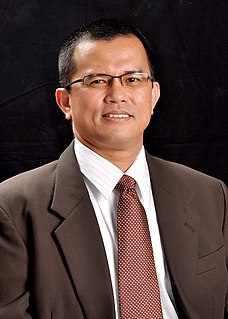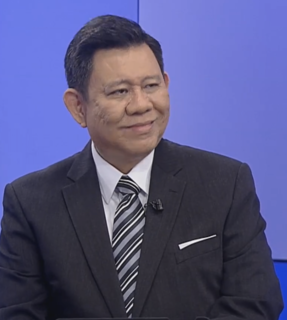
The Association of Southeast Asian Nations is a regional intergovernmental organization comprising ten countries in Southeast Asia, which promotes intergovernmental cooperation and facilitates economic, political, security, military, educational, and sociocultural integration among its members and other countries in Asia.
The ASEAN Free Trade Area (AFTA) is a trade bloc agreement by the Association of Southeast Asian Nations supporting local trade and manufacturing in all ASEAN countries, and facilitating economic integration with regional and international allies. It stands as one of the largest and most important free trade areas (FTA) in the world, and together with its network of dialogue partners, drove some of the world's largest multilateral forums and blocs, including Asia-Pacific Economic Cooperation, East Asia Summit and Regional Comprehensive Economic Partnership.

An engineering technologist is a professional trained in certain aspects of development and implementation of a respective area of technology. Engineering technology education is even more applied and less theoretical than engineering education, though in a broad sense both have a focus on practical application. Engineering technologists often assist engineers but after years of experience, they can also become engineers. Like engineers, areas where engineering technologists can work include product design, fabrication and testing. Also as with engineers, engineering technologists sometimes rise to senior management positions in industry or become entrepreneurs.
The Shanti Swarup Bhatnagar Prize for Science and Technology (SSB) is a science award in India given annually by the Council of Scientific and Industrial Research (CSIR) for notable and outstanding research, applied or fundamental, in biology, chemistry, environmental science, engineering, mathematics, medicine and Physics. The prize recognizes outstanding Indian work in science and technology. It is the most coveted award in multidisciplinary science in India. The award is named after the founder Director of the Council of Scientific & Industrial Research, Shanti Swarup Bhatnagar. It was first awarded in 1958.

The Institution of Engineering and Technology (IET) is a multidisciplinary professional engineering institution. The IET was formed in 2006 from two separate institutions: the Institution of Electrical Engineers (IEE), dating back to 1871, and the Institution of Incorporated Engineers (IIE) dating back to 1884. Its worldwide membership is currently in excess of 168,000. The IET's main offices are in Savoy Place in London, England and at Michael Faraday House in Stevenage, England.
The Sydney Accord is an international mutual recognition agreement for qualifications in the fields of engineering technology.

The ASEAN Para Games is a biannual multi-sport event held after every Southeast Asian Games involving disabled athletes from the current 11 Southeast Asia countries. Participating athletes have a variety of disabilities ranging from spastic, cerebral palsy, mobility disabilities, visual disabilities, amputated to intellectual disabilities. The ASEAN Para Games is under the regulation of the ASEAN Para Sports Federation (APSF) with supervision by the International Paralympic Committee (IPC) and the Asian Paralympic Committee and is traditionally hosted by the country where the Southeast Asian Games took place.
The Organization for Women in Science for the Developing World (OWSD) is an international organisation that provides research training, career development and networking opportunities for women scientists throughout the developing world at different stages in their career. It was founded in 1987 and was officially launched in 1993. The organisation was formerly known as the Third World Organization for Women in Science (TWOWS). It is a program unit of UNESCO and based at the offices of The World Academy of Sciences (TWAS), in Trieste, Italy.
The ASEAN Eminent Persons Group(EPG) was a group of prominent citizens from the Association of Southeast Asian Nations (ASEAN) member countries, tasked to create the ASEAN Charter. The group was formed on 12 December 2005 via the 11th ASEAN Summit Declaration in Kuala Lumpur, Malaysia.

The Institute of Food Technologists (IFT) is an international, non-profit scientific society of professionals engaged in food science, food technology, and related areas in academia, government and industry. It has more than 17,000 members from more than 95 countries.
The International Union of Food Science and Technology (IUFoST) is the global scientific organization and voice for food science and technology representing more than 200,000 food scientists and technologists from over 38 countries. It is a voluntary, non-profit association of national food science organizations. IUFoST is a full scientific member of the established in 1962, devoted to the advancement of, one of only 31 scientific unions worldwide and the only global representative of food science and technology to notable organizations such as the World Health Organization (WHO), Food and Agriculture Organization (FAO) of the United Nations, United Nations Development Programme and (UNDP), CODEX Alimentarius.
The Borlaug CAST Communication Award, formerly the Charles A. Black Award, is presented annually by the Council for Agricultural Science and Technology (CAST) for outstanding achievement by a scientist, engineer, technologist, or other professional working in the agricultural, environmental, or food sectors for contributing to the advancement of science in the public policy arena. Primary consideration will be given to candidates who are actively engaged in promoting agriculture through research, teaching, extension, or mass communication; who have made significant contributions to their discipline or field; and who demonstrate a passionate interest in communicating the importance of agriculture to policymakers, the news media, and the public.

Caesar Aya-ay Saloma is a professor of the National Institute of Physics (NIP) at the University of the Philippines College of Science and a member of the National Academy of Science and Technology.

Lourdes J. Cruz is a Filipino biochemist whose research has contributed to the understanding of the biochemistry of toxic peptides from the venom of fish-hunting Conus marine snails. The characterization of over 50 biologically active peptides from the snail's venom had been made possible, in part, by her studies.

The Enlargement of the Associationof Southeast Asian Nations is the process of expanding the Association of Southeast Asian Nations (ASEAN) through the accession of new member states. This process began with ASEAN's five original members, who founded the association through the signing of Bangkok Declaration in 1967. Since then, the ASEAN's membership has grown to ten with the accession of Cambodia in 1999.

The National Academy of Science and Technology is the highest recognition and scientific advisory body of the Philippines under the Department of Science and Technology. It was created through Presidential Decree 1003-A issued by President Ferdinand E. Marcos in 1976 to honor and recognize Filipino scientists who made worthy contributions in the advancement of science and technology in the country. It also recommends individuals to be conferred the Order of National Scientist upon approval of the President of the Philippines.

The Mustafa Prize is a science and technology award, granted to top researchers and scientists from the Organisation of Islamic Cooperation (OIC) member states. The prize is granted to scholars of the Islamic world as one of the symbols of scientific excellence in recognition of the outstanding scientists and pioneers of scientific and technological cooperation and development in the world. The science and technology $500,000 prize, Medal, and Diploma are awarded to Muslim researchers and scientists, regardless of whether they live in Muslim-majority nations or elsewhere, as well as non-Muslim scientists in Muslim countries. In 2016, science journal called the prize, the Muslim Nobel.

Julio Cabral Teehankee is a Filipino political scientist. He is Full Professor of Political Science and International Studies at De La Salle University (DLSU) where he served as Chair of the Political Science Department (1994-2007); Chair of the International Studies Department (2008-2013); and Dean of the College of Liberal Arts (2013-2017).

Project NOAH is the Philippines' primary disaster risk reduction and management program. It was initially administered by the Department of Science and Technology (DOST) from 2012 to 2017, but is now managed by the University of the Philippines.